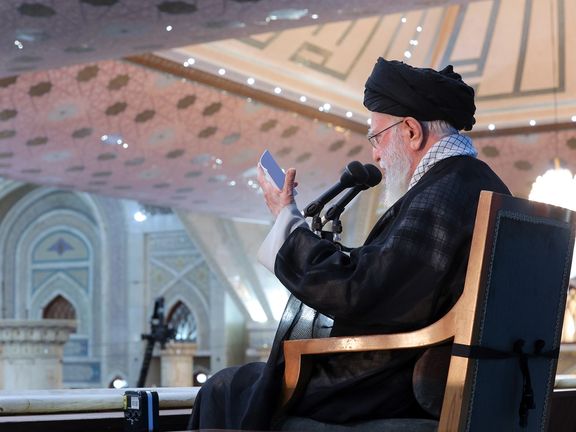Khamenei rebuffed US nuclear offer, not talks

Tehran’s response to Washington’s proposal to halt uranium enrichment in exchange for sanctions relief has been marked by deep distrust and combative rhetoric—but not a complete break from diplomacy.

Tehran’s response to Washington’s proposal to halt uranium enrichment in exchange for sanctions relief has been marked by deep distrust and combative rhetoric—but not a complete break from diplomacy.
The proposal has yet to be revealed officially, but it is said to include a halt-for-sanctions-relief clause and an enrichment consortium involving the United States and some of Iran’s Arab neighbors.
“Why do you interfere in whether Iran enriches uranium or not—what business is it of yours?” Supreme Leader Ali Khamenei said on Wednesday, dismissing US objections to domestic enrichment by Iran.
Khamenei delivered one of his harshest speeches in recent memory, denouncing the proposal and pouring cold water on hopes of an immediate resolution to the nuclear standoff.
Minutes later, Foreign Minister Abbas Araghchi reiterated that no deal excluding enrichment would be accepted, and Nuclear Chief Mohammad Eslami declared that Iran’s program would continue “with full force.”
Strategic ambiguity
Despite the sharpness of his remarks, Khamenei stopped short of ending negotiations—a nuance not lost on Iranian analysts, many of whom saw room for continued backchannel diplomacy.
His tone of suspicion echoed deeper cultural themes. Some commentators likened it to the writings of novelist Sadeq Hedayat, whose characters in Alaviyeh Khanom and Haji Aghaview the world as a web of deception and distrust, responding with preemptive cynicism.
Even before Khamenei’s speech, Iranian outlets had rallied against any framework that excluded enrichment. The official news agency IRNA published two sharply worded pieces on Tuesday.
One called Washington’s position “a gamble doomed to fail,” while the other warned the talks were headed for deadlock unless Tehran’s right to enrich was preserved.
State broadcaster IRIB maintained its usual pessimism.
In a symbolic moment following Khamenei’s address, it abruptly cut a weather update to broadcast a Moscow street interview, where Russian citizens praised Iran’s founder, Ayatollah Ruhollah Khomeini, and his prophecy of communism’s fall—blending nostalgia with present-day complexity.
Press looking ahead
Wednesday marked the anniversary of Khomeini’s death in 1989, a national holiday with no newspapers in circulation. Even online publications were dominated by reverential pieces about the former Supreme Leader.
But Tuesday’s press and foreign-based Persian outlets struck a more somber tone. The reformist site Rouydad24 warned that what it called the achievements of five rounds of talks remained fragile, and that issues like zero enrichment could trigger collapse.
Though few in Iran or abroad believe war is imminent, some exiled Iranian analysts suggested the impasse could embolden Israel, long bent on dismantling Tehran’s nuclear infrastructure.
Meanwhile, U.S. media reported that a new round of indirect talks—possibly in Oman—could take place as early as next week.